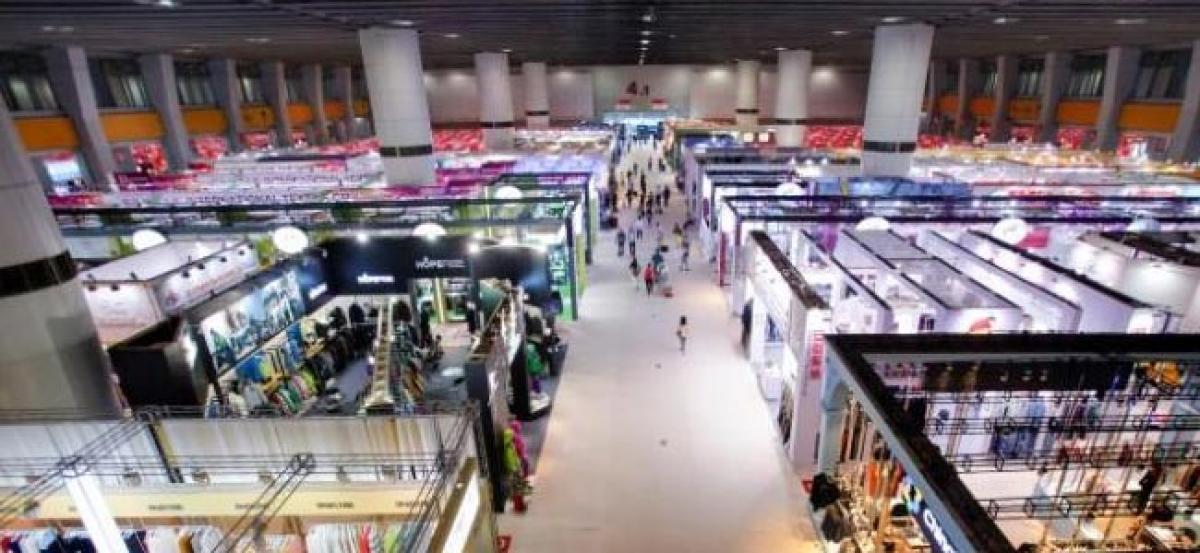Live
- Udayanidhi Stalin calls for measures to prevent public life disruption during monsoon
- ‘Ram Nagar Bunny’ review: A promising debut for ‘Attitude Star’
- Military jet carrying 96 South Koreans arrives home from Lebanon amid escalating tensions
- Ben Stokes ruled out of England’s first Test vs Pakistan; Brydon Carse set for debut
- Light to Moderate Rains Forecasted for Telangana Over the Next Three Days
- 21 Indian startups raise $93 million across 16 deals this week
- Meningitis: Infants, young kids at higher risk, vaccines may help, say experts
- Two US B-1B bombers conducted joint drill with South Korean Air Force
- RJD criticises JD-U for demanding Bharat Ratna for Nitish Kumar
- India successfully tests 4th generation, very short range air defence system against range of threats
Just In

China\'s August imports unexpectedly rose 1.5 percent, the first expansion in 22 months, official data showed on Thursday, suggesting domestic demand in the world\'s second-largest economy is picking up.
China's August imports unexpectedly rose 1.5 percent, the first expansion in 22 months, official data showed on Thursday, suggesting domestic demand in the world's second-largest economy is picking up.
Exports fell by 2.8 percent from a year earlier, less than markets had expected.
That left the country with a trade surplus of $52.05 billion for the month, the General Administration of Customs said.
Analysts polled by Reuters had expected exports to fall 4.0 percent and imports to drop 4.9 percent, resulting in a trade balance of $58 billion.
KEY POINTS
* Exports -2.8 pct y/y (forecast -4.0 pct, July -4.4 pct)
* Imports +1.5 pct y/y, (forecast -4.9 pct, July -12.5 pct)
* Trade surplus $52.05 bln (forecast $58 bln, July $52.31 bln)
* Jan-Aug exports -7.1 pct y/y, imports -9.0 pct
* Customs says pressure on exports likely to ease in Q4
COMMENTARY:
ZHOU HAO: SENIOR EM ECONOMIST, COMMERZBANK IN SINGAPORE
"The improvement in China’s imports is partially due to base effects. But more importantly, it reflects that the restocking process in the commodity sector. That is, commodity traders would want to hoard more physical bulk as they see further upside risk in commodity prices. Notably, onshore steel and coal prices are picking up strongly in the past few months, which could have boosted speculation that the prices of other commodities, such as iron ore and oil, might have bottomed out."
LIU XUEZHI, ANALYST AT BANK OF COMMUNICATIONS, SHANGHAI
"Exports in August showed some rebound, in line with our expectations. On external demand, the Baltic Dry Index has rebounded and the international shipping market improved. The U.S. economy is relatively stable and expectations for a Fed interest rate rise are increasing. In Europe, although July data and H1 data were affected by Brexit, the refugee crisis and other negative shocks, PMI and other indicators showed some improvement in August.
"But pressures on exports still exist … a rebound in exports will not be strong. For the whole year, dollar-dominated exports are likely to drop, but the pace of decline could narrow compared with last year."
CHESTER LIAW: ECONOMIST AT FORECAST PTE IN SINGAPORE:
"This is the fifth consecutive month that the growth of exports denominated in USD were negative, while that of CNY were positive. While it would be rather far-fetched to claim that the authorities are engaging in one-dimensional thinking (manipulation of the yuan to boost exports), the divergence is becoming too much of a coincidence. In any case, exports denominated in yuan should see positive growth this year."
WANG JIANHUI: ECONOMIST, CAPITAL SECURITIES, BEIJING
"Exports have stabilized near recent historical averages as the economy has basically stabilized.
"For imports, the biggest price factors are crude oil and iron ore, but otherwise there have not been big price increases. The improvement in imports is mostly a reflection of stronger domestic demand. Chinese companies are restocking, and also are now expecting prices to start rising. There is also some expectation that the economy is improving."
"As we are entering the high season in the fourth quarter, we expect exports to stay stable and imports to improve as higher prices spread to more products."
JULIAN EVANS-PRITCHARD: CHINA ECONOMIST, CAPITAL ECONOMICS, SINGAPORE
"Part of the improvement in imports can be explained by price effects. During the past couple of years, import values have been dragged down by falling global commodity prices. But with prices now recovering, this drag is fading.
"Nonetheless, the size of the pick-up suggests that there may also have been some improvement in import volumes last month which would add to recent positive signs on domestic demand, including better-than-expected PMI readings.
"Looking ahead, a gradual recovery in global demand probably means some further upside to export growth in the coming quarters. Import growth should also pick up further on the back of stronger domestic demand and a further recovery in global commodity prices."
BACKGROUND
-- China's exports have fallen for 13 of 14 months amid stubbornly sluggish global demand and weak commodity prices. Net exports were a 10.4 percent drag on China's economy in the first half of the year.
-- Imports have also been mired in a long slump, falling since late 2014, reflecting sharp declines in global commodity prices but also subdued demand at home.
-- China's exports of some materials such as steel have aggravated supply gluts, intensifying global deflationary pressures.
-- China's own move up value chains and its more dominating presence within supply chains means its needs can be met more by domestic production rather than imports.

© 2024 Hyderabad Media House Limited/The Hans India. All rights reserved. Powered by hocalwire.com







